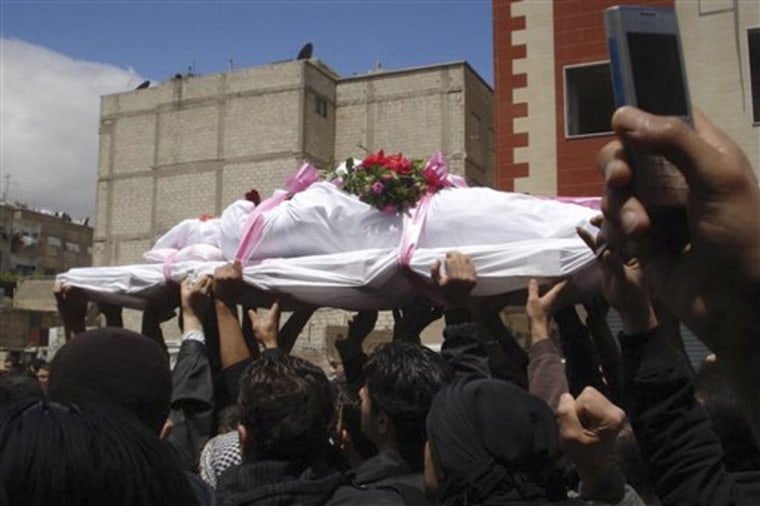Syrian security forces detained dozens of opposition activists and fired from rooftops in a seaside town Sunday as authorities turned to pinpoint raids after days of bloodshed brought international condemnation and defections from President Bashar Assad's regime.
The strategy, described by a rights activist, appeared aimed at rattling the opposition's leadership and showing that the state's ability to conduct arrest sweeps has not changed despite abolishing nearly 50-year-old emergency laws last week.
The rising level of violence — more than 120 people dead since Friday — brought calls from the watchdog group Human Rights Watch for a U.N. inquiry. But Sunday's tactics also suggest a government effort to head off the round of protest marches.
The police raids, which began late Saturday, concentrated around the capital Damascus and the central city of Homs, a hotbed of demonstrations against Assad's authoritarian rule, said Ammar Qurabi, head of the National Organization for Human Rights in Syria.
"These people are not being arrested in a legal way. They are being kidnapped," Qurabi said, claiming the plainclothes security agents did not have formal arrest warrants.
Qurabi did not have full figures for those detained, but said at least 20 people were arrested in Homs. A resident in the Damascus suburb of Douma said at least five people were taken into custody and authorities cut Internet and telephone lines.
Later, security forces moved into the coastal town of Jableh, claiming they were searching for weapons, said Qurabi. He cited witnesses saying that police and army units opened fire from rooftops even though there were no apparent threats and no protests in progress. At least one person was killed and three wounded, he said.
"I am terrified ... People in the street are getting shot," a resident of Jableh told The Associated Press by phone.
The accounts could not be independently confirmed because Syria has expelled journalists and restricted access to trouble spots. Witnesses spoke on condition of anonymity for fear of reprisals.
Assad has blamed most of the unrest on a "foreign conspiracy" and armed thugs trying to sow sectarian strife. The state-run news agency SANA said 286 police officers have been wounded since the uprising began. It did not give further details.
But possible cracks could be emerging from within.
Two members stepped down from the provincial council in the southern region of Daraa, which has the highest death toll in the country. The resignations came a day after two lawmakers and a religious leader from Daraa also turned their backs on Assad in disgust over the killings.
Such internal rifts have added resonance since nearly all opposition figures have been either jailed or exiled during the 40-year dynasty of the Assad family.
"I pay my respect to the martyrs," said Bashir Mohammed al-Zoebi, one of two provincial council members who left their posts Sunday.
More than 300 people have been killed since the uprising against Assad's regime began five weeks ago, according to rights groups, which said that Friday was the deadliest day to date with 112 killed.
"After Friday's carnage, it is no longer enough to condemn the violence," said Joe Stork, deputy Middle East director for Human Rights Watch. "Faced with the Syrian authorities shoot-to-kill strategy, the international community needs to impose sanctions on those ordering the shooting of protesters."
Earlier this month, U.N. Secretary-General Ban Ki-moon called Assad to say he was "greatly disturbed" by the reports of violence. Many Western leaders, including President Barack Obama, have condemned Syria's harsh tactics to quell dissident.
Britain's Foreign Office advised against all travel to Syria because of the violence. It added that "in light of the deteriorating security situation, British nationals in Syria who have no pressing need to remain should leave by commercial means."
In Jordan, 150 Syrians living in the kingdom protested outside their embassy in Amman. "Out, out with the tyrant Bashar Assad," shouted the group, which also burned a portrait of Assad.
___
Associated Press writer Jamal Halaby in Amman, Jordan, contributed to this report.
